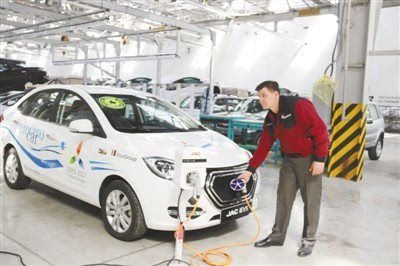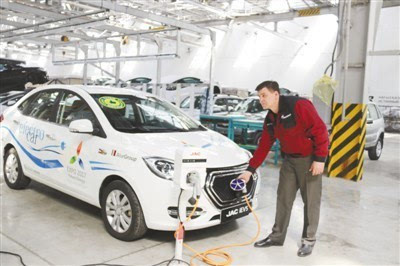By Ma Xiaoning, Zhou Hanbo, Xie Yahong, Liu Junguo from People’s Daily

China and Kazakhstan have deepened their cooperation under the framework of the China-led “Belt and Road” initiative. The win-win collaboration between Kazakhstan’s largest car manufacturer Allur Group and China-based JAC Motors is a proof of the initiative’s fruits.
The automobile factory of JAC, located at Allur’s Saryarka plant in the northern city of Kostanay, is not only an early-harvest project of China-Kazakhstan production capacity cooperation, but the only auto project among the Central Asian country’s 32 investment portfolios to revitalize its industry.
Angelina Sineva, press secretary of Allur Group, told the People’s Daily during a visit to the Saryarka plant that as Kazakhstan is expected to host the Expo 2017 in capital Astana, her company has submitted an application to the organizer in the hope that a taxi fleet composed of JAC pure-electric cars will be set up to serve the event.
She explained that the decision aims to take the expo as a platform to publicize the use of new energy cars in Kazakhstan. The billboards of the 2017 event themed "Future Energy" as well as JAC cars can be found on the way from airport to the car plant.
The JAC electric cars assembled by Allur are the only home-made ones of Kazakhstan. The eye-catching JAC iEV5 models in assembly plant have been printed with the logo of Expo 2017.
Workshop director Oleg Komissarov said that Kazakh President Nursultan Nazarbayev, during a visit to the plant in September 2016, hailed the performance of the locally assembled JAC pure-electric cars after a test drive.
The less-noisy, environment-friendly and cost-effective car is ideal choice for urban residents since its cost is only about one third of gasoline-fueled vehicles, Komissarov pointed out, adding that the model can be charged in as short as two hours.
Electric car, a future trend of the automobile industry, is high on Kazakh government’s agenda, the director said, believing that more JAC cars will be liked by tourists and run in the country with abundant tourism resources.
When asked about a thumb-up logo on the windshield, Komissarov explained that it represents the recognition by the local public and industry insiders for the car brand and its high-quality product.
Apart from electric vehicles, Allur and JAC are also cooperating on other models. The S3 and S5 series can be found on the streets of the country as well.
The Chinese maker registered over 500 percent year-on-year increase in its 2016 sales in Kazakhstan.
Anton Bykovskiy, JAC brand manager of Allur, told the People’s Daily that only five to six of more than 1,200 employees working in the plant are sent by JAC headquarters to provide technical training, while the rest are local residents.
The chief of Allur is now in China to discuss cooperation with China National Machinery Import and Export Corporation (CMC), the manager said, expounding that the deal will enable the automaker to boost its scale and capability to produce Chinese brands by purchasing more equipment from China.
Sineva added that as of the end of this year, the company would be able to assemble and produce S3 series in Kazakhstan.
With a considerable output, China’s electric cars now have better endurance power than their European counterparts, Bykovskiy praised, but stressed that its car-making industry has developed the ability of independent research and development after the introduction of foreign brands in previous years.
He added that China’s development course can offer enlightenment to Kazakhstan. “We hope to reproduce China’s success, and learn from China’s management in a bid to secure success in bigger markets,” the manager said.
The cooperation between Chinese and Kazakh car makers is a win-win choice. Kazakhstan, with geographic advantages endowed by location in the hinterland of Eurasian continent, is an ideal test field for Chinese manufacturers to expand in the overseas market, Bykovskiy illustrated.
He continued that the Chinese markers will access Commonwealth of Independent States as well as the vast EU markets after entering Kazakh territory.
Kazakhstan, Russia, Belarus and other Eurasian Economic Union members agreed previously that finished cars with over 50 percent produced domestically can be allowed duty-free access to each other’s market.
Huang Qianli, vice president of China National Vehicle Import and Export Company under CMC, told the People’s Daily that thanks to the emphasis placed by the two governments on the “Belt and Road” initiative, it is the right time to deepen and stretch bilateral cooperation.
The company plans to introduce more qualified Chinese car brands to Kazakhstan, while at the same time giving a boost to the homegrown brands of the Central Asian nation, Huang said.
Analysts believed that as Chinese and Kazakh auto industries consolidate their cooperation, more Chinese brands will show up in the Central Asian country, while more native-born local brands will emerge as well.
Pic:
Oleg Komissarov, workshop director of Allur Group’s JAC plant, demonstrates how to charge the JAC pure-electric cars. (Photo by Zhou Hanbo from People’s Daily)
The automobile factory of JAC, located at Allur’s Saryarka plant in the northern city of Kostanay, is not only an early-harvest project of China-Kazakhstan production capacity cooperation, but the only auto project among the Central Asian country’s 32 investment portfolios to revitalize its industry.
Angelina Sineva, press secretary of Allur Group, told the People’s Daily during a visit to the Saryarka plant that as Kazakhstan is expected to host the Expo 2017 in capital Astana, her company has submitted an application to the organizer in the hope that a taxi fleet composed of JAC pure-electric cars will be set up to serve the event.
She explained that the decision aims to take the expo as a platform to publicize the use of new energy cars in Kazakhstan. The billboards of the 2017 event themed "Future Energy" as well as JAC cars can be found on the way from airport to the car plant.
The JAC electric cars assembled by Allur are the only home-made ones of Kazakhstan. The eye-catching JAC iEV5 models in assembly plant have been printed with the logo of Expo 2017.
Workshop director Oleg Komissarov said that Kazakh President Nursultan Nazarbayev, during a visit to the plant in September 2016, hailed the performance of the locally assembled JAC pure-electric cars after a test drive.
The less-noisy, environment-friendly and cost-effective car is ideal choice for urban residents since its cost is only about one third of gasoline-fueled vehicles, Komissarov pointed out, adding that the model can be charged in as short as two hours.
Electric car, a future trend of the automobile industry, is high on Kazakh government’s agenda, the director said, believing that more JAC cars will be liked by tourists and run in the country with abundant tourism resources.
When asked about a thumb-up logo on the windshield, Komissarov explained that it represents the recognition by the local public and industry insiders for the car brand and its high-quality product.
Apart from electric vehicles, Allur and JAC are also cooperating on other models. The S3 and S5 series can be found on the streets of the country as well.
The Chinese maker registered over 500 percent year-on-year increase in its 2016 sales in Kazakhstan.
Anton Bykovskiy, JAC brand manager of Allur, told the People’s Daily that only five to six of more than 1,200 employees working in the plant are sent by JAC headquarters to provide technical training, while the rest are local residents.
The chief of Allur is now in China to discuss cooperation with China National Machinery Import and Export Corporation (CMC), the manager said, expounding that the deal will enable the automaker to boost its scale and capability to produce Chinese brands by purchasing more equipment from China.
Sineva added that as of the end of this year, the company would be able to assemble and produce S3 series in Kazakhstan.
With a considerable output, China’s electric cars now have better endurance power than their European counterparts, Bykovskiy praised, but stressed that its car-making industry has developed the ability of independent research and development after the introduction of foreign brands in previous years.
He added that China’s development course can offer enlightenment to Kazakhstan. “We hope to reproduce China’s success, and learn from China’s management in a bid to secure success in bigger markets,” the manager said.
The cooperation between Chinese and Kazakh car makers is a win-win choice. Kazakhstan, with geographic advantages endowed by location in the hinterland of Eurasian continent, is an ideal test field for Chinese manufacturers to expand in the overseas market, Bykovskiy illustrated.
He continued that the Chinese markers will access Commonwealth of Independent States as well as the vast EU markets after entering Kazakh territory.
Kazakhstan, Russia, Belarus and other Eurasian Economic Union members agreed previously that finished cars with over 50 percent produced domestically can be allowed duty-free access to each other’s market.
Huang Qianli, vice president of China National Vehicle Import and Export Company under CMC, told the People’s Daily that thanks to the emphasis placed by the two governments on the “Belt and Road” initiative, it is the right time to deepen and stretch bilateral cooperation.
The company plans to introduce more qualified Chinese car brands to Kazakhstan, while at the same time giving a boost to the homegrown brands of the Central Asian nation, Huang said.
Analysts believed that as Chinese and Kazakh auto industries consolidate their cooperation, more Chinese brands will show up in the Central Asian country, while more native-born local brands will emerge as well.
Pic:
Oleg Komissarov, workshop director of Allur Group’s JAC plant, demonstrates how to charge the JAC pure-electric cars. (Photo by Zhou Hanbo from People’s Daily)
 Menu
Menu
 ‘Belt and Road’ initiative brings Chinese, Kazakh car makers win-win cooperation
‘Belt and Road’ initiative brings Chinese, Kazakh car makers win-win cooperation
















